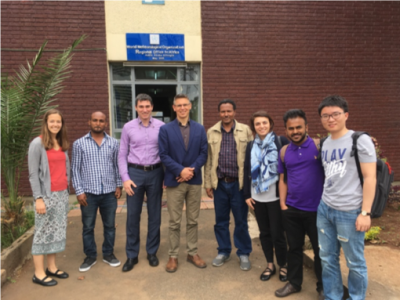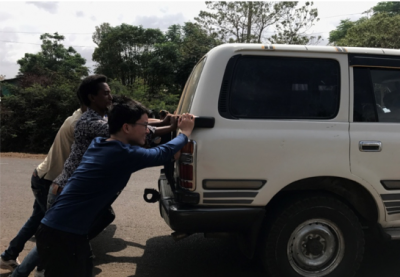The academic year for sociology, engineering and agriculture PIRE graduate students began with the kickoff of monthly brownbag meetings on September 24,2018; the students expressed from the previous semester a mutual interest in learning about their peers’ research work more intensely and in a group setting.
Joining the graduate student was the addition of four undergraduate civil engineering students who would begin formulating their research projects in the spring of 2019 and wanted a thorough introduction to the individuals and work being done.
Several weeks before this meeting the students met to discuss what their expectations of the series would be and what material they would like to cover. Everyone agreed to present their individual work in their format of choice (discussion, presentation, worksheet etc.) and to create points of discussion as a group. At this preliminary meeting, Kristen Kirksey, sociology PhD student, and Genevieve Rigler, civil engineering undergraduate student, volunteered to work together to organize the dates and topics of presentations then later brainstormed potential discussion topics that would engage the engineers and sociologists in fruitful dialogues. (This discussion was fruitful in itself!)
Each session would begin with an ice breaker, followed by a presentation from a graduate student, then a time to ask questions over lunch.
“It is nice to learn the terminology of a discipline outside of my own expertise in a comfortable setting”, expressed sociology PhD student Ezana Atsbeha.
Everyone agreed.

Meijian Yang and Fahad Khadim, both civil and environmental engineering PhD students, presented their completed work during the field visit to the sites in Ethiopia over the summer of 2018. Meijian presented the field visits to Branti, Koga, Markudi and Quashni, the four sites of interest for the project located in the Tana Basin, where the engineering teams from UConn and Bahir Dar University, installed new soil moisture sensors. The sensors were developed by Dr. Baikun Li’s group at UConn, led by Wangchi Zhou, an environmental engineering PhD student. The advantages of the simple circuits installed are that they are inexpensive, easy to assemble, install and use and they are reliable. Meijian finished by opening for discussion how the sensors can be improved and how the data can be used in the models.
Fahad presented the visit to Koga Resevoir and the meetings with various local stakeholders such as the Abay Basin Authority in Bahir Dar, the national Meterological Agency, the Ministry of Water, the Bahir Dar University and the PIRE workshop hosted at the International Livestock Research Institute (fellow CGIAR to PIRE-partner IFPRI). He also discussed about the meetings with the citizen science team, consultations with farmers, the collection of local information, and, how this trip helped him to gain hands-on experience and develop a qualitative understanding on the project area.
The five key takeaways he shared with the group were:
- Predicting the cropping season water availability is very important for ABA.
- People use water drinking purposes from hand-dug shallow wells after chlorination (woman and child take responsibility of taking water, owner bears the expense while a group of people carry out the construction).
- Water from those wells is also used in livestock and some irrigation (i.e. tomato). Irrigation of other crops (sargam, corn, wheat, teff) are mostly rain-fed.
- Knowledge, information and forecasts on groundwater levels has potential to improve farm-scale irrigation
- Farmers change the pattern depending on their interest and cost of seeds.

The trip was as academic as it was enjoyable. With a smile he told the story of some car trouble the group had along the way and described the experience as “very team building”.